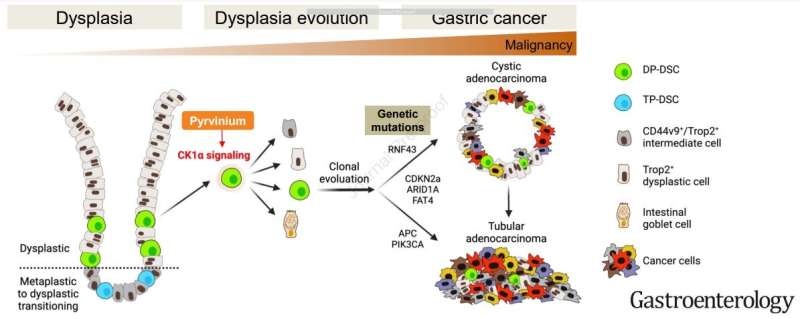Study reveals how gastric cancer forms, suggests preventive treatment

A recently published study reveals new insights into how gastric cancer develops and suggests a preventive treatment.
Eunyoung Choi, Ph.D., assistant professor of Surgery, and colleagues identified for the first time that Trop2+/CD133+/CD166+ dysplastic stem cells are a key source of clonal evolution of dysplasia to multiple types of gastric cancer. Their investigation further showed that pyrvinium, a commonly prescribed treatment for intestinal pinworms, blocked regeneration of dysplastic stem cells by controlling the CK1a signaling protein in mouse models and in human organoids.
Their findings were published online June 11 in Gastroenterology.
"The dysplastic stem cells that we identified are de novo stem cells first present during carcinogenic transition of pre-cancerous metaplasia to dysplasia in both mouse and human stomachs. Our study also demonstrated cell fate dynamics and evolutionary process of dysplastic stem cells as a single-type of non-cancerous stem cells in dysplasia and provided a clue, which explains full spectrum of a carcinogenic cascade, normal-metaplasia-dysplasia-adenocarcinoma, during gastric cancer development," said Choi, the study's corresponding author.
Globally, gastric cancer is the fifth most common cancer and the third deadliest. Dysplasia, the abnormal growth or development of cells, carries a high risk for progression to gastric cancer, but the cellular mechanisms that cause these cells to develop into cancer are not understood. Vanderbilt University Medical Center researchers are investigating this process and have published a series of studies on the subject.
In this latest study, they conducted transcriptome analysis utilizing dysplastic organoids from active KRAS gene-induced mouse stomachs. They examined cell heterogeneity and genetic alterations that occurred during clonal evolution utilizing next-generation sequencing.
"Stemness and plasticity of dysplastic stem cells led to the sequential progression of gastric adenocarcinomas and recapitulated tumor heterogeneity and genetic alterations observed in human gastric cancers," said Jimin Min, Ph.D., the study's first author, who is a postdoctoral fellow working in the Choi Laboratory at VUMC.
Pyrvinium, the drug they investigated in the lab, is a CK1a agonist that has anti-cancer effects. The researchers found that it could selectively block stemness and viability of both mouse and human dysplastic stem cells. The current standard of treatment for gastric dysplasia is limited to endoscopic resection or surgical excision of small lesions. The researchers concluded that controlling dysplastic stem cell activity with a CK1a agonist targeted therapeutic intervention may be an effective approach to reduce the risk of dysplasia progression to gastric cancer.
More information: Jimin Min et al, Dysplastic stem cell plasticity functions as a driving force for neoplastic transformation of pre-cancerous gastric mucosa, Gastroenterology (2022). DOI: 10.1053/j.gastro.2022.06.021



















